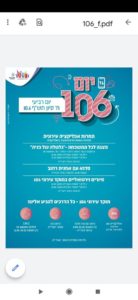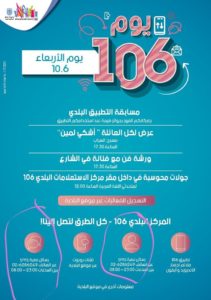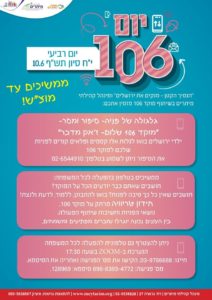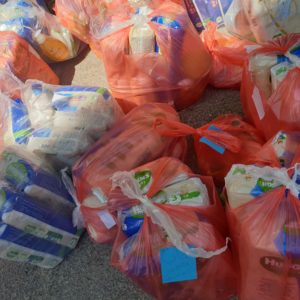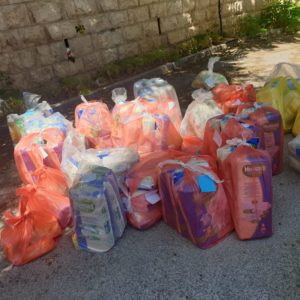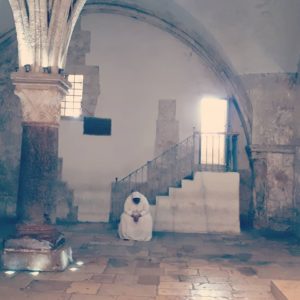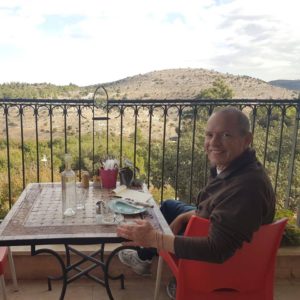Mark Your Calendar – 10.6 – A Day to Celebrate the 106 Municipal Hotline
On Sunday morning, Daniella crawled out from under her blanket,
Brushed her teeth, put on a mask,
Left her house to go to school, and suddenly saw
That a dog had done his business. Everyone crowded around, all in a huff,
Only Daniella didn’t understand all the fuss
“Why don’t you just register a complaint in the 106 app”?
(It reads like a children’s rhyme in Hebrew, below.)
One of the huge accomplishments of the Little Prince – Cleaning Up Jerusalem Together (and the blog category about it is here) is that it has put clean streets at the top of the Jerusalem Municipality’s agenda. As such, it was only natural that the day to celebrate the work of the 106 Municipal Hotline – held appropriately on 10.6, the tenth of June – be produced in collaboration with activists from the Little Prince. Designed and planned online (coronavirus restrictions prevented any in-person events) It included virtual tours of the 106 Municipal Hotline, plays for children about how to care for their environment and engage the Municipality, the ‘Story of a Garbage Can,’ app competition, trivia games, and more.
Here’s how it started.
Efrat Givaty, one of the leaders of the Little Prince, came up with an idea, which at the time seemed crazy, to create a 106 Appreciation Day. It would be a day of love and responsibility for Jerusalem. A day in which residents would commemorate activism and their ability to influence their environment. A day to look around, to take responsibility, and to be involved so that the city can be a better place for all of us.
We started to dream and began envisioning exhibits of sanitation equipment (garbage can, receptacle, underground can, etc.), alongside a photography exhibit at Safra Square, children riding on garbage trucks with sanitation workers, a huge event in the park, tours of the 106 hotline and more. We brought all these ideas to a meeting at the 106 hotline on March 8, which dealt with a number of issues. When the idea of 106 Appreciation Day came up, they might not have understood exactly what we wanted, but they politely went along, smiling in agreement.
And then came the coronavirus. And like everything, 106 Appreciation Day stopped in its tracks, gone.
As soon as the restrictions were raised in mid-May, contact was made with the 106 hotline and joint work began again.
This was really a joint effort. Betty Testa, the 106 hotline manager, invited residents and professionals from the operations department to think together and work together from the outset. In fact, no planning or preparation was done without the residents. It was truly a joint venture from the start, with ownership of and responsibility taken by all partners. Throughout the (total of two) weeks in which the work was done to prepare for the day’s events, the brainstorming, decision-making, planning and execution were shared by the different professionals at the hotline and operations department – and the residents. Despite the differences between the employees and residents, there was a sense of one organic team working together and mutually for a common goal, without tensions, without gaps. Really, really, together.
This is one of the great successes of this day – professionals and residents can work together to achieve common goals in the city, each contributing its abilities and skills in a way that leverages and empowers the final product.
All along, it was clear that the day’s activities would be available to all parts of the city: the ultra-Orthodox, Arab East Jerusalem and Jewish West Jerusalem. Activities were tailored to be culturally, programmatically and linguistically-sensitive, as were all publications.
Usually, there are separate publications so that residents in different parts of the city do not really know what is going on in East Jerusalem, West Jerusalem, or among the ultra-Orthodox. For 106 Appreciation Day the publications were both integrated and separate, so that anyone could “peek” into what was happening in a different area of the city. The municipal spokesman’s office went along with all our requests and created impressive and high-quality products. Here’s one example of a video they made:
Now, we can’t go back. June 10th, 10.6 as the Israelis write it, has been established as ‘106 Appreciation Day.’ Together we created a framework and content. Now we get to fantasize and dream for next year. Here’s a second video, a behind-the-scenes look at the 106 hotline:
Here’s the summary Facebook post from the Little Prince Facebook group:
Many thanks to the Jerusalem Foundation, the US Embassy in Jerusalem and Tel Aviv, and the Rayne Foundation for their support of the Little Prince.


